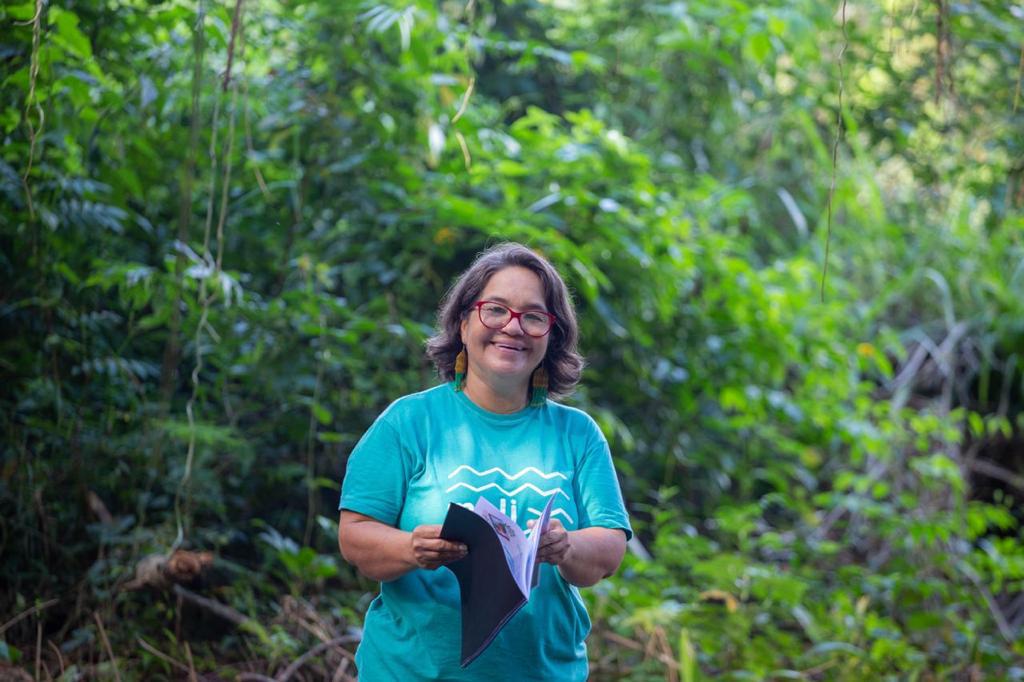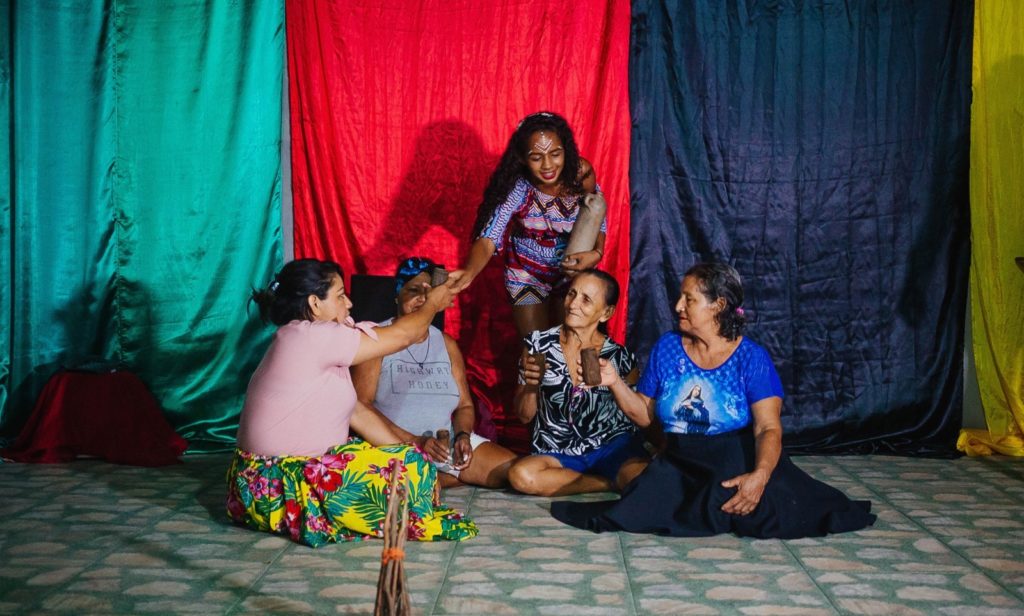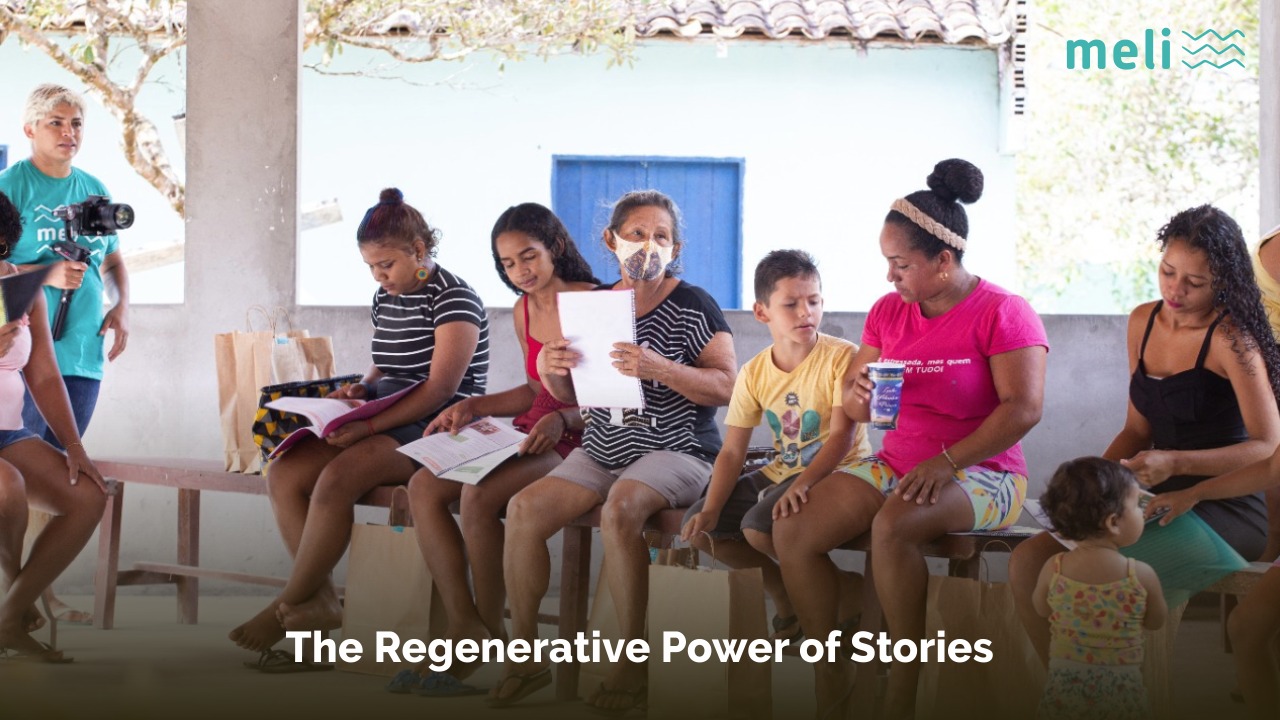Stories make up a great part of the identity of Amazonian communities which turns their oral culture into a crucial player against the destruction of the Amazon Rainforest. Get to know the stories of the communities we worked with so far and their potential to regenerate the forest!
Author: Sina von der Heyde
Auf Deutsch lesen. Leia em Português.
::
“Stories matter. Many stories matter. Stories have been used to dispossess and to malign. But stories can also be used to empower, and to humanize. Stories can break the dignity of a people. But stories can also repair that broken dignity.” ― Chimamanda Adichie Ngozi
::
Stories matter as they inherit a great power to bring change. All over the world stories form an essential part of human reality. This unique, universal tradition of storytelling connects us humans across borders but also with our ancestors throughout centuries. Stories also play an essential role in the Amazon Region. As part of the Amazonian identity, they form a rich and diverse oral culture, often with “encantados”, so called “enchanted beings” related to the protection and harmony of the forest.
This culture is particularly endangered by the advance of deforestation. With stories being lost, the forest loses a crucial part of its protection. But this loss does not only happen metaphorically as the stories are strongly related to the culture of the Amazonian communities — the destruction of this culture reflects directly in the loss of the forest!
::
Our Storytelling Workshops
Acknowledging the importance of local stories, Meli created a methodology of Storytelling Workshops to understand the context, challenges and wishes of the Amazonian communities. In the core of our Storytelling Workshops is Cynthia, a kind-hearted, empathetic pedagogue and children’s book writer, born and raised between the Amazonian rivers Negro and Solimões. With her expertise she organizes and coordinates Meli’s Storytelling Workshops, concentrating on the oral culture of the Amazonian communities, Members of Meli.


::
As the workshops give space to the participants and their stories, Cynthia focusses on the ability to deeply listen to one another. “Let us listen to what the other person is saying, let it develop and ripen in our minds so that we can express it together with our own thoughts and create new knowledge and insights”, as Cynthia says. The participants also start identifying themselves in connection with their home and see the beauty of it, which supports them and their land to flourish.
“Let us listen to what the other person is saying, let it develop and ripen in our minds so that we can express it together with our own thoughts and create new knowledge and insights.”
This setting opens a safe-space for the participants that can share their very own, personal story, recall the stories of their ancestors and also get to know each other in a new way. One of the participants of the Storytelling Workshop that Cynthia held at IALA Amazônico called Marcos told us that he truly enjoyed listening to the stories of others and was reminded of the stories that his grandmother once told him.
::
Transformation through Storytelling and its cultural importance
Stories are not only a part of our identity, they also have a transformative capacity. During the workshop at the Frei Henri Smallholders’ Community, Cynthia witnessed the power of the community’s women and their leadership. Frei Henri’s hard-working, inspiring women are leading regeneration in previously degraded areas and cultivating them — regardless of the disrespect of their human rights due to colonial structures which they suffered in the last decades. By telling their own stories, these women can be proud of their history and honour it — yes, telling their story can empower, bring change and transformation!

Stories can also reveal strong bonds between humans. At the Quilombola Community of Bracinho do Icatu, where Cynthia held Meli’s first Storytelling Workshop, she perceived that these women form a strong and unique unity. They shared stories of their struggles and just this simple act of putting their thoughts and their pain out there can help finding their strength and reconnecting to their common, valuable roots.

For the Gaviões, an indigenous community living close to the city of Marabá that participated in Meli’s last Storytelling Workshop, telling stories means to keep their culture alive. “It all started with the Sun and the Moon, all Humanity came afterwards” — the indigenous storyteller Rikpàrti shared a part of the Creation of the World according to the Gavião Culture. Remembering how important storytelling is to keep a culture alive, Tuxati tells us: “When I was a child, my father was going to take honey to produce ‘Tom’” and “the women would [use the honey to] produce a medicine they would use on the back of the children’s neck”. But valuable stories about these techniques and many more are slowly being lost as the community’s culture is endangered.
Tatyane, a smallholder woman from Frei Henri, emphasized on the importance of storytelling for learning how essential nature is for us humans: “knowing life experiences of nature, our own and those of others helps us to see how much we need her [nature] for everything: to live, eat, breathe, medicine or therapy, nature is essential for our survival”. Yes, sharing our life stories can bring about change regarding our relationship with nature, learning that she is our home and that without her we cannot achieve much. But, as we all know, the Amazon Rainforest is in big danger — and maybe all these stories can be a key to this problem.
“We need her [nature] for everything: to live, eat, breathe, medicine or therapy, nature is essential for our survival”
:
Protecting the Amazonian Rainforest through Storytelling
Cynthia told us of one more dimension of Amazonian storytelling — a dimension that depends on an intact rainforest and which therefore holds the power to protect this precious ecosystem from all the destruction.
During the workshops, the Amazonian communities shared old stories of enchanted beings, like for example of a specific bird that for the Quilombola Women symbolizes the protector of the forest or a big snake — the “Boiuna”. There are different versions of stories about this snake, as Cynthia explains, but she is perceived as a metaphor for a protective guardian that prevents people with bad intentions from entering the area.

But all of the stories about these enchanted beings depend on an intact forest, as Cynthia emphasizes — “the enchanted need the forest and the rivers”. If the forest and its animals die, this rich oral history will die with them. For people that have another background, explains Cynthia, these stories can stay simple stories, but they form a vital part of the identity of the people living there. Therefore, the preservation of the amazonian flora and fauna has a special value for them.
“The enchanted need the forest and the rivers.”
These legends as well as the specific stories of the communities about their very own reality hold a great power to regenerate and humanize the Amazonian Rainforest. They can therefore be a vital part in the fight against environmental degradation, showing the diverse beauty of the communities’ region to the world and emphasizing on why it is important to protect the Amazon Rainforest.
Your donation can have a positive impact on the world!
Subscribe to receive our Newsletter!
Find us also at Linkedin, Facebook, Twitter or Instagram
www.meli-bees.org
❤️


Wow, very insightful read. I can’t agree more to the power of story telling and the importance of documenting indigenous knowledge.